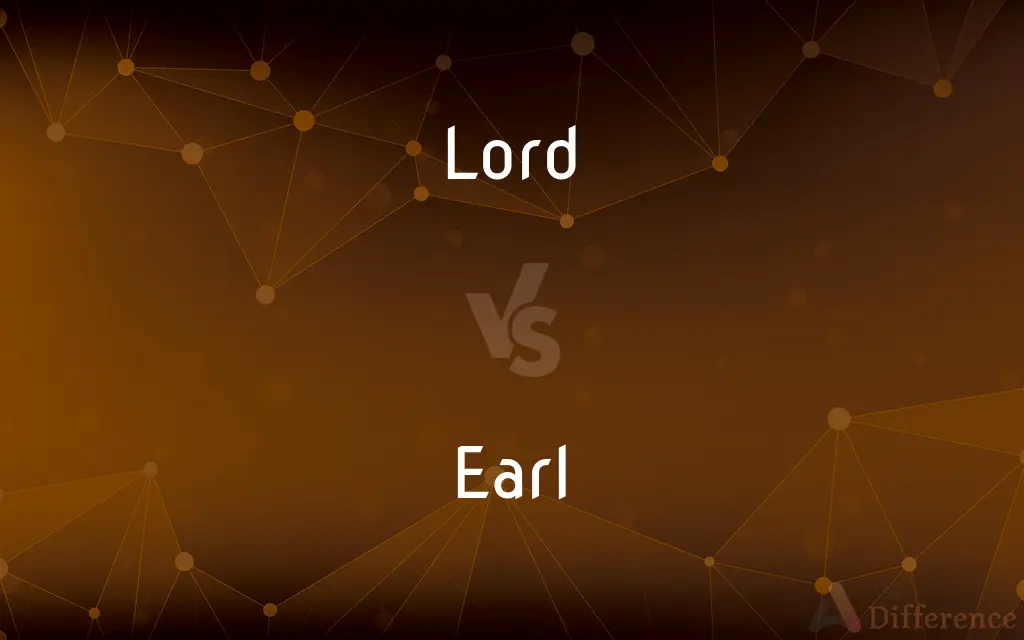Lord vs. Earl — What's the Difference?
By Maham Liaqat & Fiza Rafique — Updated on March 28, 2024
Lord is a general title denoting nobility or authority, used across various ranks, while Earl is a specific noble rank in the British peerage, ranking below a Marquess and above a Viscount.

Difference Between Lord and Earl
Table of Contents
ADVERTISEMENT
Key Differences
A lord is a broad term that applies to various levels of nobility and authority, including titles ranging from barons to dukes in the United Kingdom. It signifies someone with power or influence, whether through noble birth, grant, or office. Whereas an Earl is a specific title within the British peerage system, originally denoting a chief or leader and now positioned between a Marquess and a Viscount, indicating a specific hierarchical status.
The term "lord" can also refer to non-noble authorities, such as landlords or individuals holding certain positions of power, reflecting a wider range of applications beyond hereditary nobility. On the other hand, the title of Earl is exclusively hereditary (or life peerage in modern times), tied to the land and its governance, and passed down or granted within the confines of the peerage system.
Lords can be found in various cultures and countries, with the title adapting to different languages and legal systems, thus broadening its scope of application. Earls, however, are primarily a feature of the British nobility system, with historical roots specific to England and later the United Kingdom, showcasing a more geographically limited application.
In terms of responsibilities, lords might have varied duties depending on their rank and the context of their title, from overseeing lands to participating in the governance of the realm. Earls, given their specific rank, have had roles historically tied to governing regions or shires and holding judicial and military responsibilities within their domain.
The perception and social significance of these titles have evolved, with "lord" maintaining a broader cultural and societal relevance, often used in formal and informal contexts to denote respect or authority. The title of Earl, while still respected, is more tightly bound to the aristocratic traditions and ceremonies of the British peerage, reflecting its unique place in the hierarchy of nobility.
ADVERTISEMENT
Comparison Chart
Rank
General term for nobility; varies widely.
Specific noble rank within the British peerage.
Scope
Broad, can apply to various titles and positions of authority.
Exclusive to the British nobility system.
Origin
Old English and other European traditions.
Specifically English, later adopted into the British system.
Responsibilities
Varies widely; can include governance, land oversight, etc.
Historically tied to regional governance, judicial, and military roles.
Geographic Relevance
Widespread across different cultures and countries.
Primarily in England and the United Kingdom.
Compare with Definitions
Lord
A man of high rank in the nobility.
The Lord of the Manor presides over the village council.
Earl
A position associated with governance of a region.
As earl.he held considerable power over the shire.
Lord
A feudal superior.especially the owner of a manor.
Tenants paid their dues to the lord.
Earl
Historically, a title denoting a chief or leader.
The earl led his warriors into battle.
Lord
A title for certain high officials and dignitaries.
The Lord Mayor will attend the city parade.
Earl
A title of nobility with its origins in the Anglo-Saxon era.
The earldom has a rich history dating back centuries.
Lord
In the UK.a general title for a peer of the realm.
Lords participate in debates in the House of Lords.
Earl
A British nobleman ranking above a viscount and below a marquess.
The Earl of Warwick is known for his philanthropy.
Lord
A territorial magnate.
Earl
A hereditary title in the peerage of the United Kingdom.
He inherited the title of earl from his father.
Lord
Lord is an appellation for a person or deity who has authority, control, or power over others, acting as a master, a chief, or a ruler. The appellation can also denote certain persons who hold a title of the peerage in the United Kingdom, or are entitled to courtesy titles.
Earl
Earl () is a rank of the nobility in Britain. The title originates in the Old English word eorl, meaning "a man of noble birth or rank".
Lord
A king.
Earl
A British nobleman next in rank above a viscount and below a marquis, corresponding to a count in continental Europe.
Lord
The proprietor of a manor.
Earl
Used as a title for such a nobleman.
Lord
Lords The House of Lords.
Earl
(entomology) Any of various nymphalid butterflies of the genus Tanaecia. Other butterflies in this genus are called counts and viscounts.
Lord
Used as a form of address for a marquis, an earl, or a viscount.
Earl
A nobleman of England ranking below a marquis, and above a viscount. The rank of an earl corresponds to that of a count (comte) in France, and graf in Germany. Hence the wife of an earl is still called countess. See Count.
Lord
Used as the usual style for a baron.
Earl
The needlefish.
Lord
Used as a courtesy title for a younger son of a duke or marquis.
Earl
A British peer ranking below a Marquess and above a Viscount
Lord
Used as a title for certain high officials and dignitaries
Lord Chamberlain.
The Lord Mayor of London.
Lord
Used as a title for a bishop.
Lord
God.
Lord
(Christianity) Jesus.
Lord
A man of renowned power or authority.
Lord
A man who has mastery in a given field or activity.
Lord
(Archaic) The male head of a household.
Lord
(Archaic) A husband.
Lord
To insist upon or boast about so as to act in a domineering or superior manner
"He had lorded over her his self-proclaimed spiritual and poetic superiority" (David Leavitt).
Lord
To act in a domineering or superior manner
An upperclassman lording over the younger students.
Lord
To have a prominent or dominating position
The castle lords over the valley.
Lord
To rule over
Lorded over a vast empire.
Lord
(obsolete) The master of the servants of a household; (historical) the master of a feudal manor
Lord
(archaic) The male head of a household, a father or husband.
Lord
(archaic) The owner of a house, piece of land, or other possession
Lord
One possessing similar mastery over others; (historical) any feudal superior generally; any nobleman or aristocrat; any chief, prince, or sovereign ruler; in Scotland, a male member of the lowest rank of nobility (the equivalent rank in England is baron)
Lord
(historical) A feudal tenant holding his manor directly of the king
Lord
A peer of the realm, particularly a temporal one
Lord
A baron or lesser nobleman, as opposed to greater ones
Lord
One possessing similar mastery in figurative senses (esp. as lord of ~)
Lord
A magnate of a trade or profession.
Lord
(astrology) The heavenly body considered to possess a dominant influence over an event, time, etc.
Lord
A hunchback.
Lord
Sixpence.
Lord
Domineer or act like a lord.
Lord
(transitive) To invest with the dignity, power, and privileges of a lord; to grant the title of lord.
Lord
A hump-backed person; - so called sportively.
Lord
One who has power and authority; a master; a ruler; a governor; a prince; a proprietor, as of a manor.
But now I was the lordOf this fair mansion.
Man over menHe made not lord.
Lord
A titled nobleman., whether a peer of the realm or not; a bishop, as a member of the House of Lords; by courtesy; the son of a duke or marquis, or the eldest son of an earl; in a restricted sense, a baron, as opposed to noblemen of higher rank.
Lord
A title bestowed on the persons above named; and also, for honor, on certain official persons; as, lord advocate, lord chamberlain, lord chancellor, lord chief justice, etc.
Lord
A husband.
Thou worthy lordOf that unworthy wife that greeteth thee.
Lord
One of whom a fee or estate is held; the male owner of feudal land; as, the lord of the soil; the lord of the manor.
Lord
The Supreme Being; Jehovah.
Lord
The Savior; Jesus Christ.
Lord
To invest with the dignity, power, and privileges of a lord.
Lord
To rule or preside over as a lord.
Lord
To play the lord; to domineer; to rule with arbitrary or despotic sway; - sometimes with over; and sometimes with it in the manner of a transitive verb; as, rich students lording it over their classmates.
The whiles she lordeth in licentious bliss.
I see them lording it in London streets.
And lorded over them whom now they serve.
Lord
Terms referring to the Judeo-Christian God
Lord
A person who has general authority over others
Lord
A titled peer of the realm
Lord
Make a lord of someone
Common Curiosities
How does one address an Earl?
An Earl is addressed as "Lord [Surname]" or "Earl of [Place]," and their spouse as "Lady [Surname]" or "Countess of [Place]."
What is the main difference between a Lord and an Earl?
A lord is a general title for nobility or authority figures, while an Earl is a specific noble rank in the British peerage.
Can anyone become a Lord?
Historically, lordship was based on noble birth, land ownership, or appointment to certain positions of power, but today, the term can be used more broadly.
Can a woman hold the title of Earl?
In the British peerage system, a woman may hold the equivalent title of Countess, either in her own right or through marriage to an Earl.
Are there Lords and Earls in other countries?
While similar titles exist in other countries, "Lord" and "Earl" are specific to the British nobility system and its historical territories.
Is the title of Earl hereditary?
Yes, the title of Earl is typically hereditary within the British peerage, passed down through generations.
What are the responsibilities of a Lord?
Responsibilities vary widely depending on the specific title and context, from governance and land management to ceremonial duties.
Do Lords have roles in the UK government?
Yes, some Lords, particularly Life Peers, serve in the House of Lords, participating in legislative review and debate.
Can the title of Lord be purchased?
While certain minor titles and honorifics can be bought, true noble titles like those of hereditary Lords and Earls cannot be purchased.
What is the historical significance of Earls?
Earls held significant military, judicial, and administrative power in medieval England and played key roles in governance.
How does one become an Earl?
Becoming an Earl usually involves inheriting the title from a predecessor, though titles can also be granted by the monarch.
How has the role of Earls changed over time?
While Earls once had considerable power and responsibilities, today their roles are largely ceremonial and social within the peerage system.
What lands do Earls govern?
Historically, Earls governed large regions or shires, but today their roles are more ceremonial without administrative powers over land.
How is the wife of an Earl referred to?
The wife of an Earl is referred to as a Countess.
What is a life peerage?
A life peerage is a noble title granted by the monarch that does not inherit to the grantee's descendants, often bestowed for public service.
Share Your Discovery

Previous Comparison
Particular vs. Universal
Next Comparison
Ganglia vs. NucleiAuthor Spotlight
Written by
Maham LiaqatCo-written by
Fiza RafiqueFiza Rafique is a skilled content writer at AskDifference.com, where she meticulously refines and enhances written pieces. Drawing from her vast editorial expertise, Fiza ensures clarity, accuracy, and precision in every article. Passionate about language, she continually seeks to elevate the quality of content for readers worldwide.
















































